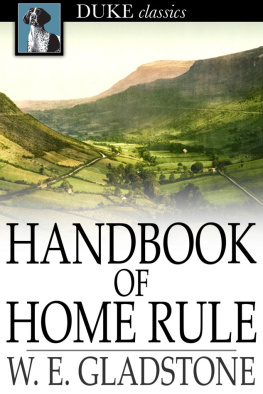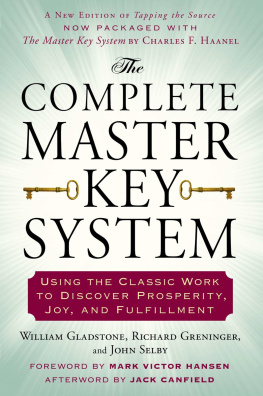Gladstone William Ewart - On Books and the Housing of Them
Here you can read online Gladstone William Ewart - On Books and the Housing of Them full text of the book (entire story) in english for free. Download pdf and epub, get meaning, cover and reviews about this ebook. year: 1901, publisher: Book on Demand, genre: Romance novel. Description of the work, (preface) as well as reviews are available. Best literature library LitArk.com created for fans of good reading and offers a wide selection of genres:
Romance novel
Science fiction
Adventure
Detective
Science
History
Home and family
Prose
Art
Politics
Computer
Non-fiction
Religion
Business
Children
Humor
Choose a favorite category and find really read worthwhile books. Enjoy immersion in the world of imagination, feel the emotions of the characters or learn something new for yourself, make an fascinating discovery.

- Book:On Books and the Housing of Them
- Author:
- Publisher:Book on Demand
- Genre:
- Year:1901
- Rating:5 / 5
- Favourites:Add to favourites
- Your mark:
- 100
- 1
- 2
- 3
- 4
- 5
On Books and the Housing of Them: summary, description and annotation
We offer to read an annotation, description, summary or preface (depends on what the author of the book "On Books and the Housing of Them" wrote himself). If you haven't found the necessary information about the book — write in the comments, we will try to find it.
On Books and the Housing of Them — read online for free the complete book (whole text) full work
Below is the text of the book, divided by pages. System saving the place of the last page read, allows you to conveniently read the book "On Books and the Housing of Them" online for free, without having to search again every time where you left off. Put a bookmark, and you can go to the page where you finished reading at any time.
Font size:
Interval:
Bookmark:
The Project Gutenberg EBook of On Books and the Housing of Them, by
William Ewart Gladstone
This eBook is for the use of anyone anywhere at no cost and with
almost no restrictions whatsoever. You may copy it, give it away or
re-use it under the terms of the Project Gutenberg License included
with this eBook or online at www.gutenberg.org
Title: On Books and the Housing of Them
Author: William Ewart Gladstone
Release Date: February 15, 2009 [EBook #3426]
Last Updated: February 4, 2013
Language: English
*** START OF THIS PROJECT GUTENBERG EBOOK ON BOOKS AND THE HOUSING OF THEM ***
Produced by Charles Hall, and David Widger
In the old age of his intellect (which at this point seemed to taste a little of decrepitude), Strauss declared perhaps a solitary unit of its kind in the New Testament: "the which if they should be written every one, I suppose that even the world itself could not contain the books that should be written."
A book, even Audubon (I believe the biggest known), is smaller than a man; but, in relation to space, I entertain more proximate apprehension of pressure upon available space from the book population than from the numbers of mankind. We ought to recollect, with more of a realized conception than we commonly attain to, that a book consists, like a man, from whom it draws its lineage, of a body and a soul. They are not always proportionate to each other. Nay, even the different members of the book-body do not sing, but clash, when bindings of a profuse costliness are imposed, as too often happens in the case of Bibles and books of devotion, upon letter-press which is respectable journeyman's work and nothing more. The men of the Renascence had a truer sense of adaptation; the age of jewelled bindings was also the age of illumination and of the beautiful miniatura, which at an earlier stage meant side or margin art, and then, on account of the small portraitures included in it, gradually slid into the modern sense of miniature. There is a caution which we ought to carry with us more and more as we get in view of the coming period of open book trade, and of demand practically boundless. Noble works ought not to be printed in mean and worthless forms, and cheapness ought to be limited by an instinctive sense and law of fitness. The binding of a book is the dress with which it walks out into the world. The paper, type and ink are the body, in which its soul is domiciled. And these three, soul, body, and habilament, are a triad which ought to be adjusted to one another by the laws of harmony and good sense.
Already the increase of books is passing into geometrical progression. And this is not a little remarkable when we bear in mind that in Great Britain, of which I speak, while there is a vast supply of cheap works, what are termed "new publications" issue from the press, for the most part, at prices fabulously high, so that the class of real purchasers has been extirpated, leaving behind as buyers only a few individuals who might almost be counted on the fingers, while the effective circulation depends upon middle-men through the engine of circulating libraries. These are not so much owners as distributers of books, and they mitigate the difficulty of dearness by subdividing the cost, and then selling such copies as are still in decent condition at a large reduction. It is this state of things, due, in my opinion, principally to the present form of the law of copyright, which perhaps may have helped to make way for the satirical (and sometimes untrue) remark that in times of distress or pressure men make their first economies on their charities, and their second on their books.
The annual arrivals at the Bodleian Library are, I believe, some twenty thousand; at the British Museum, forty thousand, sheets of all kinds included. Supposing three-fourths of these to be volumes, of one size or another, and to require on the average an inch of shelf space, the result will be that in every two years nearly a mile of new shelving will be required to meet the wants of a single library. But, whatever may be the present rate of growth, it is small in comparison with what it is likely to become. The key of the question lies in the hands of the United Kingdom and the United States jointly. In this matter there rests upon these two Powers no small responsibility. They, with their vast range of inhabited territory, and their unity of tongue, are masters of the world, which will have to do as they do. When the Britains and America are fused into one book market; when it is recognized that letters, which as to their material and their aim are a high-soaring profession, as to their mere remuneration are a trade; when artificial fetters are relaxed, and printers, publishers, and authors obtain the reward which well-regulated commerce would afford them, then let floors beware lest they crack, and walls lest they bulge and burst, from the weight of books they will have to carry and to confine.
It is plain, for one thing, that under the new state of things specialism, in the future, must more and more abound. But specialism means subdivision of labor; and with subdivision labor ought to be more completely, more exactly, performed. Let us bow our heads to the inevitable; the day of encyclopaedic learning has gone by. It may perhaps be said that that sun set with Leibnitz. But as little learning is only dangerous when it forgets that it is little, so specialism is only dangerous when it forgets that it is special. When it encroaches on its betters, when it claims exceptional certainty or honor, it is impertinent, and should be rebuked; but it has its own honor in its own province, and is, in any case, to be preferred to pretentious and flaunting sciolism.
A vast, even a bewildering prospect is before us, for evil or for good; but for good, unless it be our own fault, far more than for evil. Books require no eulogy from me; none could be permitted me, when they already draw their testimonials from Cicero
It is in truth difficult to assign dimensions for the libraries of the future. And it is also a little touching to look back upon those of the past. As the history of bodies cannot, in the long run, be separated from the history of souls, I make no apology for saying a few words on the libraries which once were, but which have passed away.
The time may be approaching when we shall be able to estimate the quantity of book knowledge stored in the repositories of those empires which we call prehistoric. For the present, no clear estimate even of the great Alexandrian Libraries has been brought within the circle of popular knowledge; but it seems pretty clear that the books they contained were reckoned, at least in the aggregate, by hundreds of thousands.
Louis the Fourteenth, of evil memory, has at least this one good deed to his credit, that he raised the Royal Library at Paris, founded two centuries before, to 70,000 volumes. In 1791 it had 150,000 volumes. It profited largely by the Revolution. The British Museum had only reached 115,000 when Panizzi became keeper in 1837. Nineteen years afterward he left it with 560,000, a number which must now have more than doubled. By his noble design for occupying the central quadrangle, a desert of gravel until his time, he provided additional room for 1,200,000 volumes. All this apparently enormous space for development is being eaten up with fearful rapidity; and such is the greed of the splendid library that it opens its jaws like Hades, and threatens shortly to expel the antiquities from the building, and appropriate the places they adorn.
But the proper office of hasty retrospect in a paper like this is only to enlarge by degrees, like the pupil of an eye, the reader's contemplation and estimate of the coming time, and to prepare him for some practical suggestions of a very humble kind. So I take up again the thread of my brief discourse. National libraries draw upon a purse which is bottomless. But all public libraries are not national. And the case even of private libraries is becoming, nay, has become, very serious for all who are possessed by the inexorable spirit of collection, but whose ardor is perplexed and qualified, or even baffled, by considerations springing from the balance-sheet.
Font size:
Interval:
Bookmark:
Similar books «On Books and the Housing of Them»
Look at similar books to On Books and the Housing of Them. We have selected literature similar in name and meaning in the hope of providing readers with more options to find new, interesting, not yet read works.
Discussion, reviews of the book On Books and the Housing of Them and just readers' own opinions. Leave your comments, write what you think about the work, its meaning or the main characters. Specify what exactly you liked and what you didn't like, and why you think so.







